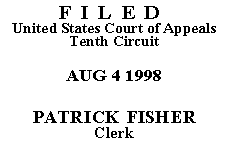

| NICK AVILA, JR.,
Petitioner-Appellant, v. UNITED STATES OF AMERICA, |
|
Petitioner Nick Avila, Jr., appeals the district court's denial of his petition for writ of error coram nobis. We affirm.
In September 1987, Avila, a Denver attorney, was indicted by federal grand jury on four drug-related counts. He was subsequently convicted of all four counts and was sentenced to four concurrent ten-year terms of imprisonment and was fined a total of $10,000. His convictions were affirmed on direct appeal to this court. United States v. Avila, No. 88-1427 (10th Cir. 1989). In July 1989, the Colorado Supreme Court disbarred Avila as a result of his convictions. People v. Avila, 778 P.2d 657 (Colo. 1989).
Avila completed his period of imprisonment and, on December 18, 1997, filed a petition for writ of error coram nobis, asking the district court to set aside his federal convictions because "he was denied his constitutional right to an objective prosecutor at all stages of his trial proceedings." In support of his petition, Avila alleged the prosecuting attorney in his case "made written and oral accusations that [Avila] attempted to murder him and otherwise intimidate his prosecution of [Avila] just prior to the commencement of the jury trial." According to Avila, these accusations were based on the discovery, shortly before trial, of an explosive device affixed to the prosecutor's car, and on the fact that the prosecutor's apartment complex was fire-bombed on the morning Avila's trial commenced. Avila further alleged the writ was an appropriate remedy because, despite having served his period of imprisonment, he continued to suffer criminal and civil penalties resulting from the convictions. In particular, he alleged he still owed a substantial portion of the criminal fine levied against him, and he was unable to regain his license to practice law because of his convictions. The district court denied Avila's petition, concluding even if Avila's allegations were true, he had failed to demonstrate his trial was affected in any way by the prosecutor's personal interests or motives.
The writ of coram nobis is an "extraordinary remedy" available to a petitioner no longer in custody who seeks to vacate his conviction in circumstances where the petitioner can demonstrate that he is suffering civil disabilities as a consequence of the criminal convictions and that the challenged error is of sufficient magnitude to justify the extraordinary relief. United States v. Castro, 26 F.3d 557, 559 (5th Cir. 1994). "Because the writ continues litigation after final judgment and exhaustion of other remedies, relief should be 'allowed through this extraordinary remedy only under circumstances compelling such action to achieve justice.'" Klein v. United States, 880 F.2d 250, 253 (10th Cir. 1989) (quoting United States v. Morgan, 346 U.S. 502, 511 (1954)). Thus, "[i]t is presumed that the proceedings leading to the conviction were correct . . . and the burden is on the petitioner to demonstrate that the asserted error is jurisdictional or constitutional and results in a complete miscarriage of justice." Id.
Avila contends he need not demonstrate actual prejudice flowing from the prosecutor's alleged bias against him. Instead, he argues, the mere existence of the prosecutor's bias is sufficient to raise due process concerns and should have required the prosecutor to recuse himself from further participation in the trial. Avila cites Young v. United States ex rel. Vuitton et Fils S.A., 481 U.S. 787, 789 (1987), which held counsel for a party that is the beneficiary of a court order may not be appointed as special prosecutor in a contempt action alleging violation of that order. We find Young inapposite as it involved a court's authority to initiate criminal contempt proceedings and to appoint a private prosecutor. Nothing in this case is remotely similar. Avila was prosecuted for drug-related crimes, not criminal contempt. The prosecutor was an Assistant United States Attorney, not a special prosecutor. The prosecutor's alleged bias stems from his being the target of two apparent crimes, not from his representation of another person or entity.
More on point is United States v. Lorenzo, 995 F.2d 1448 (9th Cir. 1993), where defendants were convicted for involvement in sending IRS 1099-MISC forms to government officials, including a United States Attorney and several assistants, and seeking tax refunds. Defendants argued on appeal that, because the United States Attorney and several assistants were "victims" of the crime, the office of the United States Attorney should have recused itself from prosecuting the case. The Ninth Circuit rejected this argument, holding defendants had not demonstrated prejudice. Id. at 1453. Other circuits agree that a criminal defendant complaining of an appearance of conflict on the part of a prosecutor must demonstrate actual prejudice, particularly where the defendant's challenge is not asserted until after conviction. See, e.g., United States v. Lilly, 983 F.2d 300, 309-10 (1st Cir. 1992); Dick v. Scroggy, 882 F.2d 192, 197 (6th Cir. 1989); Wright v. United States, 732 F.2d 1048, 1056 n.8 (2d Cir. 1984); United States v. Heldt, 668 F.2d 1238, 1276-77 (D.C. Cir. 1981).
Because Avila has not even attempted to demonstrate actual prejudice flowing from the prosecutor's alleged bias, we agree with the district court that Avila has failed to overcome the presumption that the proceedings leading to his convictions were correct.
AFFIRMED. The mandate shall issue forthwith.
Entered for the Court
Mary Beck Briscoe
Circuit Judge
*. This order and judgment is not binding precedent, except under the doctrines of law of the case, res judicata, and collateral estoppel. The court generally disfavors the citation of orders and judgments; nevertheless, an order and judgment may be cited under the terms and conditions of 10th Cir. R. 36.3.